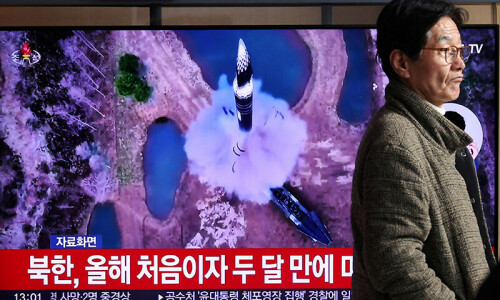 Multilateral lenders are becoming increasingly uneasy over the slowing pace of crucial, ongoing governance, fiscal and economic reforms undertaken by the Punjab government under its flagship Punjab Resource Manage-ment Programme (PRMP) due to what many officials term as visibly weakened ownership of the programme by the new political leadership of the province.
Multilateral lenders are becoming increasingly uneasy over the slowing pace of crucial, ongoing governance, fiscal and economic reforms undertaken by the Punjab government under its flagship Punjab Resource Manage-ment Programme (PRMP) due to what many officials term as visibly weakened ownership of the programme by the new political leadership of the province.
“The donors are concerned whether or not the timelines for the current financial year agreed under the programme for various interventions to push the reforms agenda in the province forward would be met,” a senior official of a donor agency, who did not want to give his name, told this scribe.
“The Asian Development Bank (ADB) has already decided to halve the first tranche of $200 million for health related reforms in the province,” he said.
The ADB had committed last year to disburse $400 million in two equal instalments over a period of three years for undertaking health related reforms in the province to achieve targets set in the Millennium Development Goals (MDGs).
“The donors’ concerns mainly stem from lack of any progress in different reform areas during the last several months caused due to the official inaction and failure to fill the top vacancies at the PRMP. One of our main development partner - the Asian Development Bank (ADB) - has, for example, recently conveyed the highest decision-making authorities in the province that immediate appointment of a new Programme Director of the PRMP is crucial for moving the reforms agenda forward and to meet timelines agreed with the bank,” a Punjab government official, who has remained involved in the implementation of the reforms programme during last couple years, said on the condition of anonymity.
A provincial finance department official, who also did not want to be identified, acknowledged that the delay in the appointment of a fulltime programme director and three deputy directors at the PRMP was a major factor that had slowed down decision-making on how to move forward with reforms significantly.
“But it is not a PRMP-specific phenomenon alone. Officers - senior and junior both - are kind of scared, unsure, and are reluctant to take decisions. Nobody knows if the decisions he is supposed to take would be approved of by his seniors and political leadership or not. The wholesale transfers of officials since the inception of the Pakistan Muslim League-Nawaz’s government in the province has frightened many of us. You may be posted against a vacancy in the morning and moved to another place in the evening,” the finance department official said.
Unless the political leadership, especially chief minister Shahbaz Sharif, starts taking policy decisions - rather than focusing only on the day-to-day populist measures like ordering arrest or sacking of one official or the other for alleged corruption or mismanagement or some other charge, there is little hope of things moving forward in any area, let alone governance reforms,” he said.
The previous government had launched wide-ranging governance, fiscal and economic reforms initiative under the PRMP in 2003 with ADB’s financial assistance of $500 million, spread over five years. A major chunk of the ADB loan proceeds under PRMP was utilised for retirement of high cost federal debt, capitalisation of pension and provident funds and spending on development in the province.
The main objective of the reforms agenda agreed between Punjab and the ADB was to strengthen the capacity of the provincial administration for “efficient and sustainable delivery of public services in order to improve socioeconomic indicators as outlined in the provincial Poverty Reduction Strategy Paper (PRSP)”.
That objective was to be achieved “through reforms in governance structures, systems, and processes to strengthen provincial finances, realign provincial institutions for pro-poor service delivery, and create opportunities for growth and income generation in the private sector”.
On completion of the first PRMP in 2007, the Punjab government and the ADB agreed to undertake the next phase of reforms under the second PRMP. Under the next phase of reforms, the ADB had committed to provide $750 million in three equal tranches spread over five years to 2012.
The PRMP-II was to focus improvements in public fiscal and financial management, deepening of pension reforms, strengthening of efficient and effective civil service and facilitation of greater private sector participation in the economy and in the public service delivery.
The ADB released first tranche of the soft loan towards the end of last fiscal and the second is due to be released at the end of the current financial year after an appraisal of the reforms by the ADB team.
“We can meet the reform timelines and qualify for the second tranche provided the political leadership decides to bring its focus back on the reforms agenda. The governance reforms are not only crucial for qualifying budgetary support from the donors but also to achieve sustainable economic growth, create jobs, reduce poverty, and improve public service delivery,” the finance department official said. “Not everything is lost. We should pursue the reforms for the betterment of our own people,” he said.
He agreed with the suggestion that the pace of reforms in the past had been painfully slow and the previous government had failed to fully achieve the targets because of its own political agenda. Yet, he said, the kind of political ownership of the reform programme shown by the previous government endeared it to the donors who were prepared to give any amount of money to the province for budgetary support.
“The present leadership will do itself a lot of good if it reverts its attention to the reforms agenda for improving the life of its citizens,” said the official.















































Dear visitor, the comments section is undergoing an overhaul and will return soon.